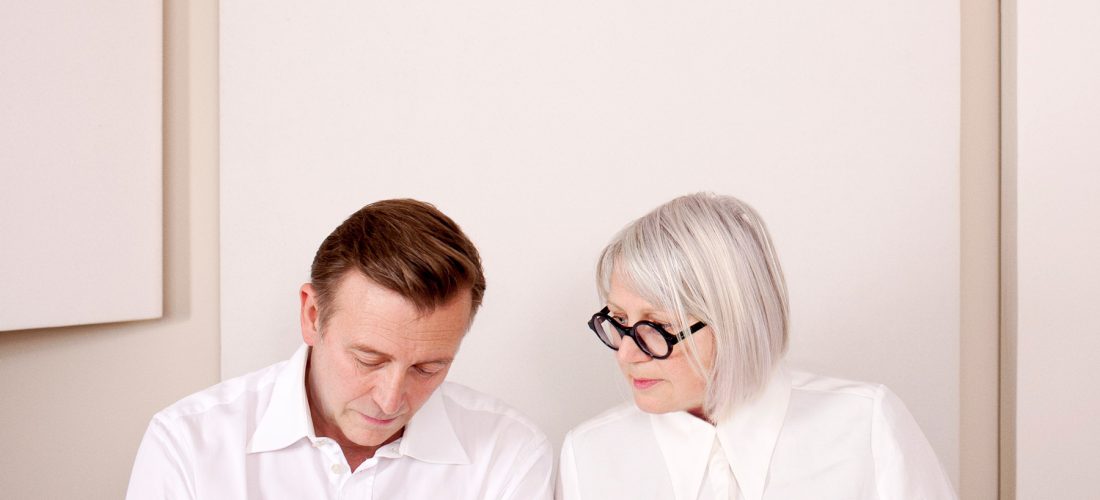Elizabeth Fraser Still Sounds Divinely Alien on Sun’s Signature Debut
With UK dream-pop pioneers Cocteau Twins, singer Elizabeth Fraser’s appeal had more to do with the way she projected raw emotions (joy, worry, uneasiness) than the songs she sang. Instead of attempting poetry, she sang in tongues, shaping her feelings with crude but often beautiful vocal sounds, and a few occasional words in English, which entwined themselves around her bandmates Robin Guthrie and Simon Raymonde’s fantasias. (Did she really say “silly, silly saliva”?) You didn’t listen to Cocteau Twins so much as you felt them. Fraser’s otherworldliness and the way she seemed to revel in her obscurity paved paths for Julee Cruise, Portishead, and Sarah MacLachlan, and she subsequently inspired Jeff Buckley and Miley Cyrus, among others.
Despite her prominence, Fraser has spent much of the 25 years since Cocteau Twins separated out of the spotlight. She made a show-stopping turn on Massive Attack’s “Teardrop” and has made guest appearances here and there, but in that time she has only put out two releases of her own. Both were singles. Compared to Cocteau Twins’ prolific output — eight albums and 11 EPs in eight years — it’s like a drought.
With her first music in 13 years, Sun’s Signature — the self-titled debut EP by her a project with life partner Damon Reece (Massive Attack’s drummer, whose credits include Spiritualized and Echo and the Bunnymen) — Fraser still sounds like a celestial transmission in search of a vessel to possess. She has the same magic she did decades ago, but it has changed and improved in some ways. At age 58, her voice chimes higher than it once did, only adding to the intrigue, since it now hovers above the baroquely textured arrangements Reece cut with musicians who have played with Massive Attack, Spiritualized, and Julian Cope. One important contributor, improbably, is former Genesis lead guitarist Steve Hackett. For the release, they musicians play dulcimer, celestes, vibraphones and several other instruments likely collecting dust at your local Guitar Center, and they make them sound magical, summoning the classic 4AD style that Cocteau Twins pioneered alongside Dead Can Dance and This Mortal Coil while still feeling modern.
From the first track, “Underwater,” Fraser’s voice sounds as mysterious as it always did, floating atop a plinky music box as she sings impressionistic words (and mostly discernible words at that) about finding the world shining in her and bluebirds. The music vaguely recalls the trippy lounge music of Fraser imitator Goldfrapp’s Felt Mountain, but her singing is unwieldy and delightfully unpredictable. On the next track, “Golden Air,” Sun’s Signature echoes more of a flickering, optimistic Cocteau Twins moodscape as Fraser’s soprano sings gracefully about “indigo moves, gentle and hesitant” over Hackett’s guitar (which is played in reverse). About halfway through, a heavier beat comes in and reshapes the feeling of the song into something darker, allowing Fraser to offer a counterpoint to the way the song started, which is one of the trademarks of her best work.
The EP’s second side (it came out this weekend on vinyl for Record Store Day ahead of a digital release) opens with “Bluedusk,” a slowly uncoiling a cabaret love song that builds to cinematic harps and a low-blowing bass clarinet. Its highlight is Fraser singing, “loove, looooove, looove” comfortably in the higher range she only flirted with earlier in her career. “Apples” is a meditation on quietude (“From the silence in me to the silence in you,” she sings, “all alone in inky night”) that slowly crescendos over seven minutes to become Fraser’s most beautiful vocal performance on the release as she layers her voice to make a choir all of her own. It ends with “Make Lovely the Day,” an almost Shakespearean love poem (“Be rest my heart … see him rise and make lovely the day”) over Hackett’s flamenco guitar playing. It’s the shortest track here, but it’s the most direct, showing more Fraser and Reece’s ambition to do something different.
The point of Sun’s Signature, of course, was for Fraser and Reece to challenge themselves, and with this EP, they’ve charted new territory without losing sight of Fraser’s pioneer past. Each song feels both familiar and new, but then again appraising Fraser’s work about as easy as reviewing the weather, since they change direction as frequently. The two musicians wrote most of Sun’s Signature over a decade ago for Fraser’s return to the stage as part of the Meltdown Festival that Anohni curated. At those performances, they performed twice as many new original songs as are on the EP, so hopefully, this record won’t be the last we hear of Fraser’s alien intonations.
